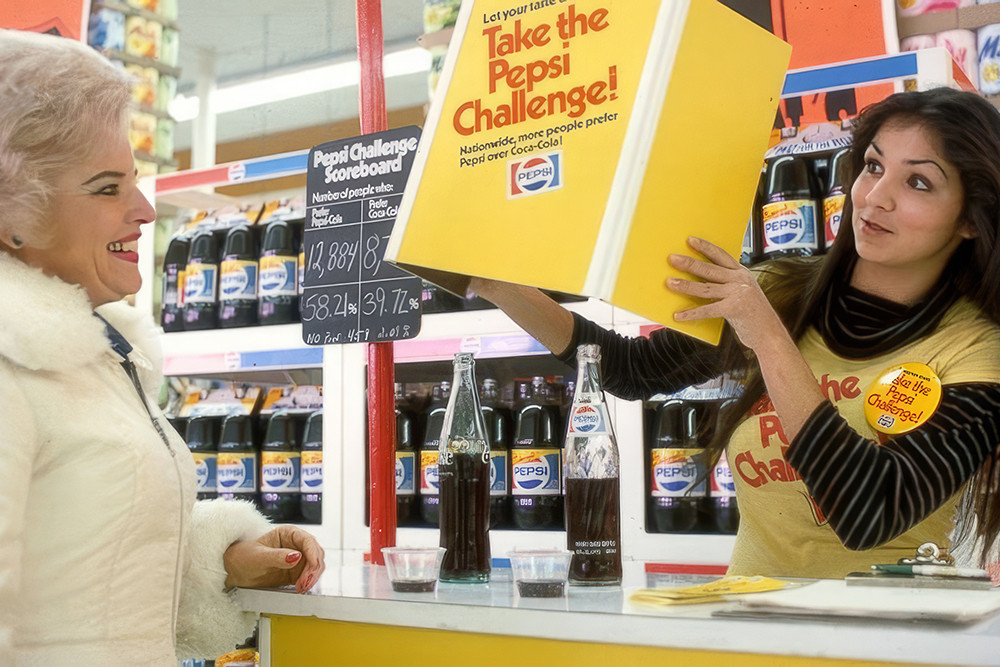
The Pepsi Challenge first began in 1975. Photo courtesy of CNW Group/PepsiCo Canada
Back in the day, I worked as the Pepsi Taste Challenge girl. Do you remember that? If you do, you’re kind of dating yourself (or does it still go on? maybe it does
I found it quite remarkable how many people swore unflagging allegiance to Coke but ended up choosing Pepsi in the blind taste test. To add to that, many of these same people would get really angry at me, claiming I must have switched the bottles or that both bottles contained Pepsi. The only way they could have chosen Pepsi is they were tricked!
I promise, I did not switch out anything. Pepsi won fair and square, but those people who were so loyal to Coke would not switch, in spite of preferring the taste of Pepsi.
People chose Coke not because of the taste (that much was proven) but because of the strong emotional connection they had to the product. It brought happiness to their lives, so they liked to “have a coke and a smile”.
Their relationship with their manager can forge similar emotional connections for technicians. Their manager is the most common reason people state for leaving a job, but it’s also the most common reason people stay in their jobs.
“Managers account for up to 70% of variance in employee engagement.” – Gallup
Great managers engage their teams and create environments where employees are engaged and productive. But, not many teams are led by great managers. Add to that the fact that technicians spend their days in the field and you can see there’s great potential for them to feel disconnected.
An excellent way to connect is through One-On-One conversations. When done regularly, One-On-Ones can be the key to open communication with employees. By spending time together, both managers and their reports learn what makes the other tick. Issues that affect the technician, the team, and the company can be discussed, and the employee will be brought into the loop on how their efforts contribute to overall success.
This is also the way to develop trust and loyalty. Without making an investment in building connections, there will be no trust. Trust is something that’s earned. It’s not automatically given to someone when they get a manager title. If managers want to earn trust, then they have to put in time building the relationship.
It’s highly important we take the time to develop relationships and trust with our team members, and the best way to do this is through regular, frequent, and consistent One-On-One conversations.
I realize this can be challenging. Who has time to sit and chat with their reports? Well, managers better make time. One-On-Ones not only help managers to develop productive relationships with their reports, they also provide opportunity to do a pulse check on employee morale and stress level—are they happy and productive? Or are they a flight risk? And who can afford to lose a good technician?
Thirty minutes, once per week is recommended, but if you can’t do that, then commit to as often as you can—at least once per month. And honour the commitment. This speaks volumes to employees who, often, have the impression their company cares very little about them. Honouring the commitment indicates respect, and, since most people don’t feel very respected at work, this will make an impact.
Not sure how to start the conversation? Here are some guidelines to use as a jumping off point:
- Begin by letting the technician talk about whatever’s on their mind. This could be about work, or could be about personal topics they choose to share. Start by asking them to share what’s on their minds, how things are going in the field, or even what their plans are for the weekend.
- Then the manager can share what’s on their mind. It could be what’s happening at work that the technician needs to know about, upcoming work, safety discussions, etc. Managers should be prepared to share a little about themselves, personally, if the technician chooses to go down that road.
- Finally, the conversation should include some discussion of the growth and professional development of the technician. This could mean courses, future career plans, or even just talking about podcasts, videos, or articles that the technician might be interested in.
Our thoughts, feelings, and memories can change our experience with a product (like Coke and Pepsi), and with our workplace. The key is to develop a relationship with employees that encourages the feeling of connection. If managers can do that, then they can inspire loyalty and engagement, and wouldn’t it be great to have that at work?